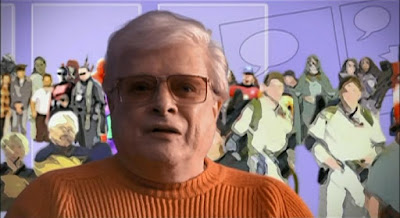(1975) Directed by Ellen Hovde, Albert Maysles, David
Maysles, and Muffie Meyer: Edith ‘Little Edie’ Bouvier Beale, Edith Beale,
Brooks Hyers, Jack Helmuth, Lois Wright; Available on DVD
Rating: ****
“I think that the film is kind of a Rorschach test, where it
taps on the various abilities and disabilities of half of the audience – the
ability to accept unconventionality, for example. Not everybody has that. But
if you have it, then you’re more likely to very strongly connect with the film,
and if you have a low tolerance for people who are different, then you might
get embarrassed for these women…” – Albert Maysles (from 2001 Criterion DVD
commentary)
A good documentary can transport you to a different place,
providing an unprecedented glimpse into worlds we seldom see. Some provide
journeys to exotic locations, while others delve into the superficially
mundane, uncovering hidden surprises. Grey Gardens immerses us in the
daily life of two eccentric individuals who originated from a position of great
wealth and influence, and now exist in the tattered remains of their past glory.
The film opens with a brief primer (through a montage of
newspaper articles) on the East Hampton, New York Beale estate, known popularly
as Grey Gardens. The residents, elderly Edith Bouvier Beale (Jacqueline Onassis’
aunt) and her middle-aged daughter Edie (“Little Edie”), were nearly evicted,
due to Grey Gardens’ advanced squalor. Filmmakers David and Albert Maysles set
their sights on the two women, who enjoy a symbiotic, albeit occasionally adversarial
relationship. The former socialites occupy only a couple of spots in their dilapidated 28-room mansion, along with a menagerie
of cats and woodland creatures that pop in and out. The once-elegant home is an
island, adrift in a sea of dense, overgrown foliage. Shots pan around to reveal
the neighbors’ pristine homes, with their manicured grounds.
The filmmakers underscore the peculiar relationship between
mother and daughter, and their push-pull power dynamic. Little Edie is full of
contrasts and contradictions, at once yearning to break free from Grey Gardens,
yet loyal to her domineering mother. She expresses a lifetime of regret and
bitterness over dreams that weren’t followed, but seems content to live in a
state of arrested development (In a moment of self-reflection, she observes, “It’s
very difficult to keep the line between the past and the present. Do you know
what I mean? Awful difficult.”). At times, she regresses to an earlier age, reacting
to her mother’s frequent barbs like a petulant child, instead of a 56-year-old
woman. In one of the most memorable scenes, Little Edie dances (in a moment she
staged herself), in one of her many scarf ensembles,* with a small American flag,
demonstrating a level of youthful exuberance that belies her age. She lives in
a world of endless beauty pageants, debutante balls, and still fashions herself
as the most eligible bachelorette in East Hampton (“I see myself as a young girl.”).
“Big” Edith has a similar moment in the spotlight in an earlier scene, when she
sings “Tea for Two,” accompanied by her recording from several decades past.
*Fun Fact: According to co-director/co-editor Ellen Hovdie,
Little Edie always appeared in a head scarf, with a new ensemble every day.
Much to their chagrin, the filmmakers never learned if she was hiding something,
or just wanted to make a fashion statement.
Because this isn’t a success story, but rather a study of former
glory gone to seed, it’s easy to get the impression that Grey Gardens
would be a depressing viewing experience. The movie received a mixed reception
at the time of its release, with some accusing the Maysles of exploiting the Beales.
However, as the commentary by Albert Maysles, Ellen Hovde and Muffie Meyer
attests, Edith and Little Edie were quite self-aware of their image, and complicit
in how they chose to be portrayed. The film’s critics seemed to miss the point.
Grey Gardens doesn’t ask us to condone the Beales’ lifestyle, only to see
things from a different (hopefully sympathetic) point of view. Despite a mixed
reception during its initial release, Grey Gardens captured the imagination
of others over the years, with midnight screenings, a Broadway musical,
and a TV movie starring Jessica Lange and Drew Barrymore as the elder and junior
Beale, respectively. At its core, the film is a celebration of two people pursuing
life on their own terms. Whether you love them or hate them, or are somewhere
in between, their story is difficult to forget.
















